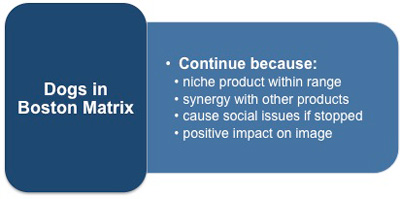Boston Matrix - Dogs

Dogs are found in slow-growing or shrinking mature markets and their market share is low. Any revenue they generate is just enough to sustain this low market share and from the organizational perspective they represent a drain on its resources because even though they may be 'breaking even' financially, they are using assets (people and capital) that could be better used to support a Question Mark or Star.
 |
Ideally, the number of Dogs should be minimized so that they don't use up resources that could be better deployed elsewhere. Many products in this category are reaching the end of their product life cycle and management need to judge the benefits of continued production against withdrawing them from the market. Any redevelopment of the product is unlikely to be covered by increased revenues because any costs associated with a redesign or relaunch will prove difficult to recover in a stagnant market.
The profitability of Dogs should be constantly reviewed as the lack of profits impacts an organization's return on assets (ROA) ratio. This ratio is important to potential investors and is one of the tools that they use to make judgments about how well your organization is being run and whether or not to invest in it.
One criticism of the Boston Matrix is that the term 'Dog' is unnecessarily pejorative and derogatory. An organization may continue to produce a Dog, even though its profitability is marginal, because of its synergy with other product offerings.
For example,
The cell phone manufacturer Nokia continues to produce a simple phone that retails for around $15. Even though there is no profit in selling the phone, customers still need to buy airtime, which is where the profit is made.
Some mature markets are so big that even a small share of them can be worth having. For example,
Snack food company Cadbury has a huge range of products including many bestsellers in their particular niche. One of their least popular products, the 'Dairy Milk Whole Nut' chocolate bar, is responsible for only around one percent of sales in a low-growth market. However, that still represents some $60 million of revenue in the UK alone.
Another reason for maintaining production of a Dog is that it can be beneficial to have a 'complete' range of products. This can add credibility to the brand at the point of sale as well as dissuading distributors from looking for other suppliers to fill any gaps in your product range.
An organization may find it worthwhile to subsidize a loss-making Dog because it benefits its public image, for example by appearing to be 'green' or socially responsible in some other way.
Finally, there may be social or political reasons for continuing with a Dog. Its production may attract government funding or the political consequences of closing down a factory or ceasing to offer a particular service may be unacceptable.
 |
Organizations would like all of their products or services to be either Cash Cows or Stars, but in reality there is always a mixed product portfolio with a variety of products at differing stages of their life cycle.
Even a company like Microsoft has Dogs: its internet search engine, Bing, has only around 4.5% market share, with Google leading by a huge margin. No one expects it to become a major revenue generator for Microsoft and even optimistic estimates expect it to account for less than 2.5% of total revenues in the foreseeable future. However, it would have such a negative impact on Microsoft's image if it were to abandon this market altogether that it continues to support this loss-making service.
You may also be interested in: Introduction to the Boston Matrix, Classifying Products and Business Units, Stars, Question Marks, Cash Cows, Dogs, Using the Boston Matrix at Brand Level, A Balanced Portfolio and Advantages and Disadvantages.



